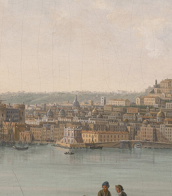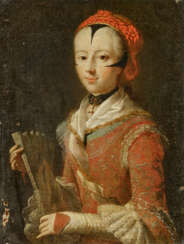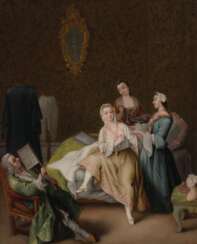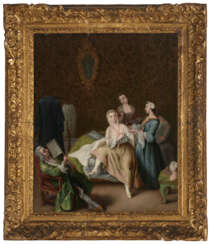пьетро лонги (1701 - 1785)
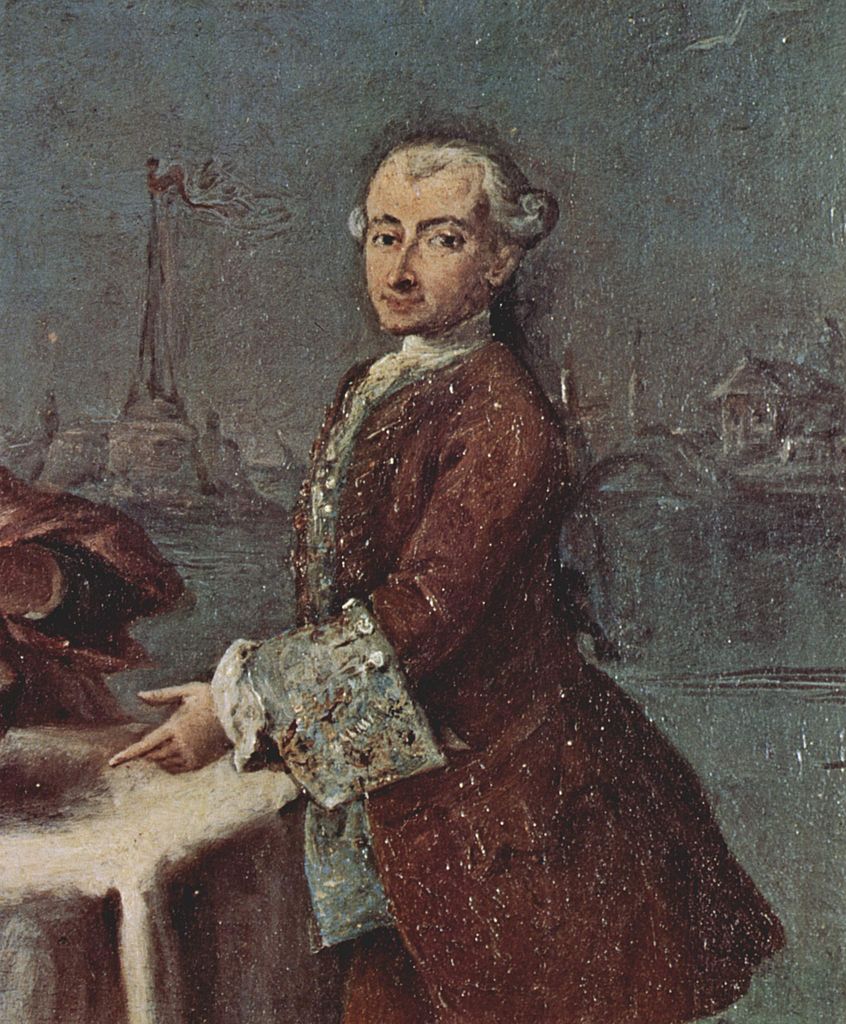
Pietro Longhi was a Venetian painter renowned for his intimate depictions of daily life in 18th-century Venice. His works, void of biting satire but possibly tinged with gentle irony, provide a unique window into the social and domestic spheres of Venetian society. Pietro Longhi's art captures a range of everyday moments, from high society gatherings to common street scenes, all characterized by a keen observation of human interaction and behavior.
Pietro Longhi's training began under the tutelage of the history painter Antonio Balestra and continued with Guiseppe Maria Crespi in Bologna, whose influence is evident in Longhi's detailed genre scenes. Returning to Venice, he shifted his focus to these smaller, more personal vignettes, starting in 1741. His works, such as "The Charlatan" and "The Ridotto in Venice," highlight the public and private lives of Venetians, often showcasing masked figures engaging in various activities, hinting at the city's famous carnival culture.
Notable works like "The Exhibition of a Rhinoceros at Venice" reflect Pietro Longhi's interest in capturing contemporary events and curiosities, offering insight into the leisure and entertainment of the time. This particular painting is part of the National Gallery's collection and stands out for its depiction of public fascination with exotic animals, intertwined with social commentary.
For collectors and art experts, Pietro Longhi's paintings are invaluable for their historical context and artistic merit, capturing the essence of Venetian life with a unique blend of realism and subtlety. His works continue to be celebrated for their detailed narrative quality and their ability to transport viewers to the heart of 18th-century Venice.
For those keen on exploring more about Pietro Longhi's contributions to art and culture, and to stay updated on sales and auction events featuring his works, subscribing for updates can be a valuable way to stay informed.
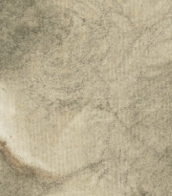

Pietro Longhi was a Venetian painter renowned for his intimate depictions of daily life in 18th-century Venice. His works, void of biting satire but possibly tinged with gentle irony, provide a unique window into the social and domestic spheres of Venetian society. Pietro Longhi's art captures a range of everyday moments, from high society gatherings to common street scenes, all characterized by a keen observation of human interaction and behavior.
Pietro Longhi's training began under the tutelage of the history painter Antonio Balestra and continued with Guiseppe Maria Crespi in Bologna, whose influence is evident in Longhi's detailed genre scenes. Returning to Venice, he shifted his focus to these smaller, more personal vignettes, starting in 1741. His works, such as "The Charlatan" and "The Ridotto in Venice," highlight the public and private lives of Venetians, often showcasing masked figures engaging in various activities, hinting at the city's famous carnival culture.
Notable works like "The Exhibition of a Rhinoceros at Venice" reflect Pietro Longhi's interest in capturing contemporary events and curiosities, offering insight into the leisure and entertainment of the time. This particular painting is part of the National Gallery's collection and stands out for its depiction of public fascination with exotic animals, intertwined with social commentary.
For collectors and art experts, Pietro Longhi's paintings are invaluable for their historical context and artistic merit, capturing the essence of Venetian life with a unique blend of realism and subtlety. His works continue to be celebrated for their detailed narrative quality and their ability to transport viewers to the heart of 18th-century Venice.
For those keen on exploring more about Pietro Longhi's contributions to art and culture, and to stay updated on sales and auction events featuring his works, subscribing for updates can be a valuable way to stay informed.
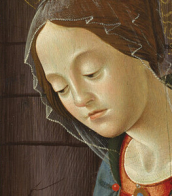

Pietro Longhi was a Venetian painter renowned for his intimate depictions of daily life in 18th-century Venice. His works, void of biting satire but possibly tinged with gentle irony, provide a unique window into the social and domestic spheres of Venetian society. Pietro Longhi's art captures a range of everyday moments, from high society gatherings to common street scenes, all characterized by a keen observation of human interaction and behavior.
Pietro Longhi's training began under the tutelage of the history painter Antonio Balestra and continued with Guiseppe Maria Crespi in Bologna, whose influence is evident in Longhi's detailed genre scenes. Returning to Venice, he shifted his focus to these smaller, more personal vignettes, starting in 1741. His works, such as "The Charlatan" and "The Ridotto in Venice," highlight the public and private lives of Venetians, often showcasing masked figures engaging in various activities, hinting at the city's famous carnival culture.
Notable works like "The Exhibition of a Rhinoceros at Venice" reflect Pietro Longhi's interest in capturing contemporary events and curiosities, offering insight into the leisure and entertainment of the time. This particular painting is part of the National Gallery's collection and stands out for its depiction of public fascination with exotic animals, intertwined with social commentary.
For collectors and art experts, Pietro Longhi's paintings are invaluable for their historical context and artistic merit, capturing the essence of Venetian life with a unique blend of realism and subtlety. His works continue to be celebrated for their detailed narrative quality and their ability to transport viewers to the heart of 18th-century Venice.
For those keen on exploring more about Pietro Longhi's contributions to art and culture, and to stay updated on sales and auction events featuring his works, subscribing for updates can be a valuable way to stay informed.
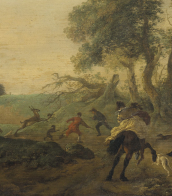

Pietro Longhi was a Venetian painter renowned for his intimate depictions of daily life in 18th-century Venice. His works, void of biting satire but possibly tinged with gentle irony, provide a unique window into the social and domestic spheres of Venetian society. Pietro Longhi's art captures a range of everyday moments, from high society gatherings to common street scenes, all characterized by a keen observation of human interaction and behavior.
Pietro Longhi's training began under the tutelage of the history painter Antonio Balestra and continued with Guiseppe Maria Crespi in Bologna, whose influence is evident in Longhi's detailed genre scenes. Returning to Venice, he shifted his focus to these smaller, more personal vignettes, starting in 1741. His works, such as "The Charlatan" and "The Ridotto in Venice," highlight the public and private lives of Venetians, often showcasing masked figures engaging in various activities, hinting at the city's famous carnival culture.
Notable works like "The Exhibition of a Rhinoceros at Venice" reflect Pietro Longhi's interest in capturing contemporary events and curiosities, offering insight into the leisure and entertainment of the time. This particular painting is part of the National Gallery's collection and stands out for its depiction of public fascination with exotic animals, intertwined with social commentary.
For collectors and art experts, Pietro Longhi's paintings are invaluable for their historical context and artistic merit, capturing the essence of Venetian life with a unique blend of realism and subtlety. His works continue to be celebrated for their detailed narrative quality and their ability to transport viewers to the heart of 18th-century Venice.
For those keen on exploring more about Pietro Longhi's contributions to art and culture, and to stay updated on sales and auction events featuring his works, subscribing for updates can be a valuable way to stay informed.
